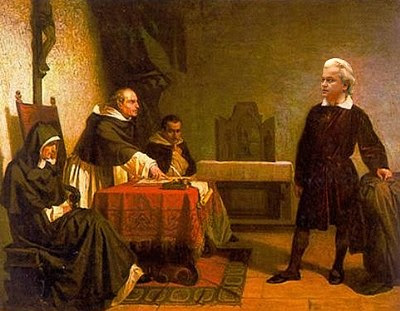
Below is an excellent précis of the Geert Wilders case that was originally published in Die Welt. It has been translated from the German for Gates of Vienna by JLH:
Islam Critic in Court- - - - - - - - -
Wilders Is a Provocateur, Not a Right-Wing Extremist
February 1 2010
by Rainer Haubrich
With his criticism of Islam, the Dutch member of parliament Geert Wilders is a polarizing force far beyond the borders if his own country. Now the splendid provocateur must answer in a court of law. But reaching a moral verdict is more difficult than many critics believe. Geert Wilders likes to play the keyboard of populism. Now he is before the court.
What is actually going on in the Netherlands? Ten years ago, the country was one of the most tolerant in Europe. It was an example of how different religions, races, values and philosophies of life could exist side-by-side. Today, the shrillest tones in the confrontation with Islam come from the Netherlands, and there too are the most radical defenders of liberal, western society. The most popular of them is Islam critic Geert Wilders, whose one-man movement, “Party for Freedom,” became the country’s second strongest force in the European elections, and even reached first place in recent polls. For a brief time now, the 46-year-old parliamentarian has been in court charged with hate speech, and the trial continues today.
There is an inner logic to the political transformation in the Netherlands. Politicians critical of Islam, like Pim Fortuyn — murdered in 2002 — gained greatly in popularity precisely because the state was too tolerant for too long of immigrants who rejected the values of their host country, because it undertook no action against the ghettoes and the rising criminality of youthful Muslim gangs or against the growing number (intelligence service estimate: 50,000) of Muslims inclined to violence. Fortuyn was the first to want to see the end of Netherlands “consensus politics” and to call the problems by name. The gruesome execution-style assassination of filmmaker Theo van Gogh in 2004 by the Netherlands-born son of a Moroccan immigrant plunged the country into an identity crisis that persists today.
The cultivated “rightist populist”
In Germany, Fortuyn received the appellation “right-wing populist,” which actually translated as radical liberal among cultivated professors and “out” homosexuals. His agenda was the defense of the enlightened lawful state against the influence of pre-modern Islam. His reply to the charge that he was hostile to foreigners, especially Moroccans and Turks, became famous: “I have nothing against Moroccans; I sleep with them.” This lightness of tone was miles away from the beer tent politicking of a Jörg Haider or a Jean-Marie Le Pen. Fortuyn criticized the fact that imams could call for violence against “inferior” gays without being prosecuted for it.
It is not without irony that a critic of these circumstances now ends up in court in the person of Geert Wilders. He plays the keyboard of populism even more obviously than Fortuyn, but he too is not at the far right edge of the political spectrum. He does not complain about the signs of decay in liberal society, but fights for the rights of women and homosexuals. As an atheist, he stands less for the Christian world view than for the tradition of religious critique. And this native of Limburg married to a Hungarian can hardly be called hostile to foreigners, for he is very popular with the Hindus living in the Netherlands, who feel quite threatened by the Muslims. In contrast to right-wing populists in France, Italy or Austria, Wilders does not apply “relativism” to the crimes of National Socialism nor flirt with anti-Semitism. More than that, he defends Israel as a liberal contrast to the authoritarian states of the Near East.
Provocation has a Price
Wilders is a splendid provocateur, even if he pushes the envelope with some of his demands, as recently for a tax on the hijab. But even beyond his own supporters, he has gained sympathy by the intrepidity with which he has defied the threats of radical Muslims. The fact that he is not the only person in the Netherlands who requires personal security, that the Somalia-born Netherlands parliamentarian Ayaan Hirsi Ali had to drop out of sight, and academic critics of Islam like the Iranian Afshin Ellian need personal protection — that is the true scandal.

2 comments:
But does anyone thinks he will be the next "boss" of the Netherands?
Does he have a chance to gain an important political job through popular elections?
If yes, how can he be silenced by this?
It seems that if he does have as many followers as it is presented to me, the judicial Dutch system is shooting at it's own foot.
You can tell it was translated from German, and a hoch newspaper German in particular. This column in a nutshell explains the rise of Hitler in Germany. If the better class write like this, someone will take action with less thought in the mean time.
Post a Comment